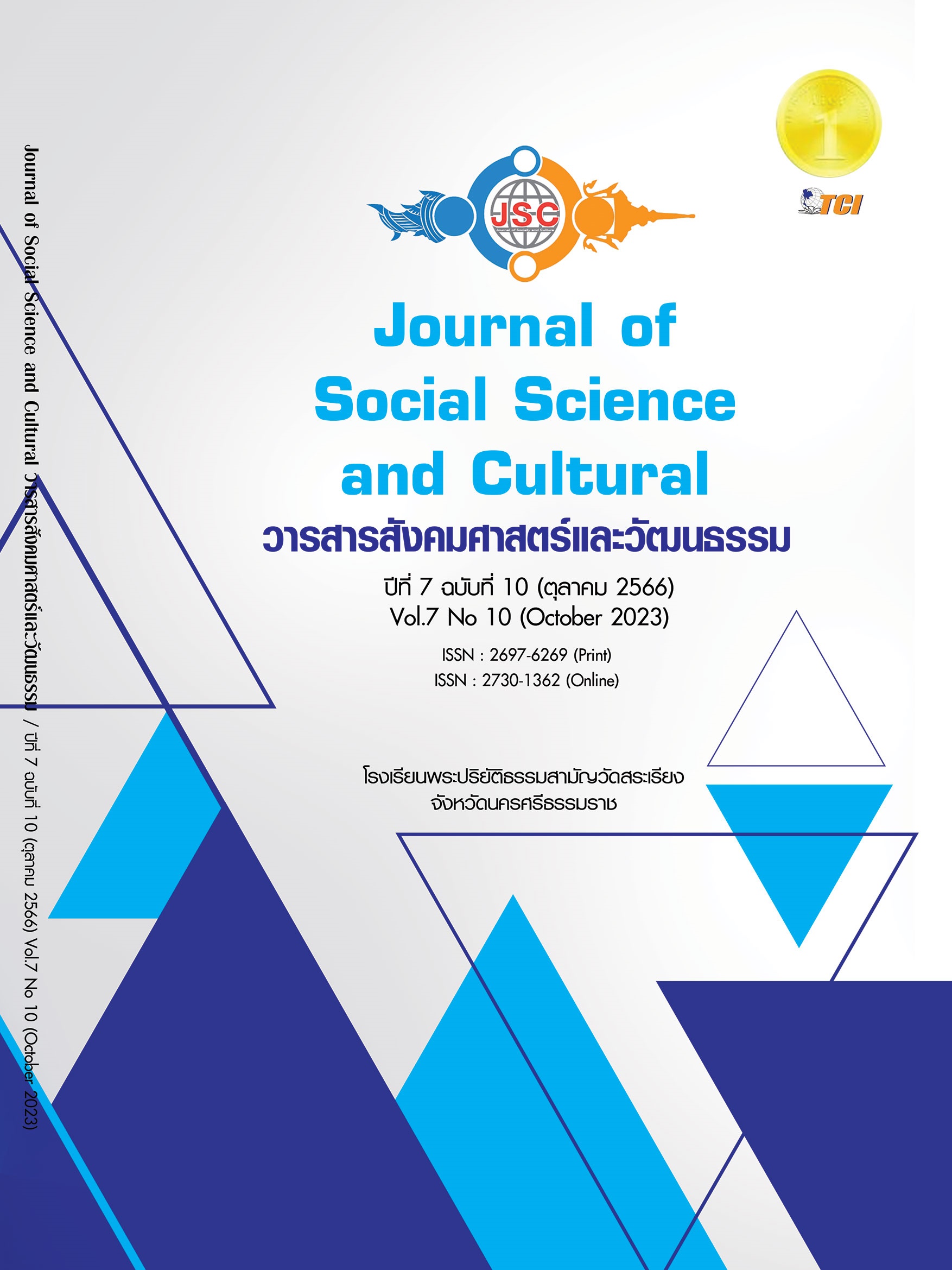(Retracted Article) THE DEVELOPMENT OF A TEACHING MODEL BASED ON CONSTEUCTIVISM THEORY TO ENCHANCE THE SCIENTIFIC CONCEPTS OF GEADE 12 UNDER THE JURISDICTION OF NAKHON SI THAMMARAT MUNICIPALITY
Main Article Content
Abstract
This objectives of this research are to 1. Study and analyze data to develop learning and teaching. 2. To develop and direct the use of learning and teaching formats. 3. To try the use of learning and teaching formats. 4. Study student’s opinions on learning and teaching according to learning and teaching formats. The result of the research concluded that 1) Basic data for developing learning and teaching models to enhance scientific concepts is that teaching and learning must rely on prior knowledge as a base for learning new things. Through a learning process that interacts with friends and teachers. Create by yourself knowledge and can share knowledge with others. There is an examination of own knowledge and understanding with teachers as facilitators. 2) A learning and teaching format based on constructivism theory to enhance concept the scientific concepts of students of Grade 12 under the jurisdiction of Nakhon Si Thammarat Municipality consists of 6 elements and a 5 - step learning and teaching process as follows: 2.1) Principles 2.2) Objectives 2.3) The learning and teaching process consists of 2.3.1) Verifying Knowledge 2.3.2) Instructing Fundament Knowledge and skill 2.3.3) Constructing Concepts 2.3.4) Sharing knowledge 2.3.5) Assessing Knowledge and Understanding 2.4) Knowledge content 2.5) Conditions for using the teaching model, consisting of 2.5.1) the role of the student 2.5.2) the role of the teacher 2.6) measurement of evaluation. 3) Students' scientific conceptions after studying according to learning and teaching formats constructivism theory were significantly higher than before studying at the .05* level. 4) Students agree with the learning and teaching process according to the learning and teaching format according to constructivism theory at the highest level.
Article Details
References
คมสัน ตรีไพบูลย์. (2557). การพัฒนารูปแบบการจัดการเรียนรู้ ตามแนวทฤษฎีคอนสตรักติวิสต์ร่วมกับรูปแบการพัฒนารูปแบบการจัดการเรียนรู้ ตามแนวทฤษฎีคอนสตรักติวิสต์ร่วมกับรูปแบบการสอนมโนทัศน์ เพื่อพัฒนามโนทัศน์และความสามารถในการแก้ปัญหาทางคณิตศาสตร์เรื่อง ภาคตัด กรวย ของนักเรียนชั้นมัธยมศึก. ใน ดุษฎีนิพนธ์การศึกษาดุษฎีบัณฑิต สาขาวิชาหลักสูตรและ การสอน. มหาวิทยาลัยบูรพา.
ทิศนา แขมมณี. (2554). ศาสตร์การสอน. องค์ความรู้เพื่อการจัดกระบวนการเรียนรู้ที่มีประสิทธิภาพ. กรุงเทพมหานคร: จุฬาลงกรณ์มหาวิทยาลัย.
ภูรินทร์ แตงน้อย. (2559). การพัฒนารูปแบบการจัดการเรียนรู้วิทยาศาสตร์ สาระที่ 6 : โลกและการเปลี่ยนแปลง เพื่อส่งเสริมมโนทัศน์และความสามารถในการแก้ปัญหาทางวิทยาศาสตร์สำหรับนักเรียนชั้นมัธยมศึกษาปีที่ 1. ใน ดุษฎีนิพนธ์การศึกษาดุษฎีบัณฑิต สาขาวิทยาศาสตร์ศึกษา. มหาวิทยาลัยศรีนครินทรวิโรฒ.
มาเรียม นิลพันธุ์. (2554). แนวคิดและหลักการทำผลงานทางวิชาการในรูปแบบการวิจัยและพัฒนา. นครปฐม: สำนักพัฒนาระบบการบริหารงานบุคคลส่วนท้องถิ่น กรมส่งเสริมการปกครองท้องถิ่น.
มาเรียม ลูกสะเดา. (2562). รูปแบบการจัดการเรียนรู้เพื่อพัฒนาทักษะการอ่านภาษาไทย สำหรับนักเรียนชั้นประถมศึกษาปีที่ 6 สังกัดองค์กรปกครองส่วนท้องถิ่น ในพื้นที่ 5 จังหวัดชายแดนภาคใต้. ใน ดุษฎีนิพนธ์ครุศาสตร์ดุษฎีบัณฑิต สาขาวิชาภาวะผู้นำการจัดการศึกษา. มหาวิทยาลัยราชภัฏสุราษฎร์ธานี.
ศักดิ์กุมภา อินชื่น. (2563). การศึกษาผลการจัดการเรียนรู้ภาษาอังกฤษเพื่อการสื่อสารเรื่อง My DailyLife โดยการประยุกต์ใช้ทฤษฎีการเรียนรู้ Constructivism ร่วมกับ EnglishVlogging สำหรับนักเรียนชั้นมัธยมศึกษาปีที่ 3. ใน วิทยานิพนธ์ครุศาสตรมหาบัณฑิต สาขาวิชาหลักสูตรและการสอน. มหาวิทยาลัยราชภัฏอุตรดิตถ์.
สุธาวัลย์ จันทร์เรืองและคณะ. (2559). การพัฒนารูปแบบการจัดการเรียนรู้การฟังการพูดภาษาอังกฤษตามแนวทฤษฎีไวก๊อตสกี้ สำหรับนักเรียนชั้นมัธยมศึกษาปีที่ 2. ใน วิทยานิพนธ์การศึกษามหาบัณฑิต สาขาวิชาหลักสูตรและการสอน. มหาวิทยาลัยมหาสารคาม.
Jacobson, W. J. & Bergman, A. B. (1999). Science for Children a Book for Teacher (3rd ed.). Englewood Cliffts, New Jersey: Prentice Hall.
Joyce, B. & Weil, M. (2009). Models of Teaching. (8th ed.). Englewook Cliff, NJ: Prentice - Hall.
Kruse, K. & Kevin, J. (2007). Technology - based training: The art and science of design, development and delivery. San Francisco, CA: Jossey Bass.
Tuckman, B. W. (1999). Conducting Educational Research. New York: Harcourt Brace Collage Publishers.


